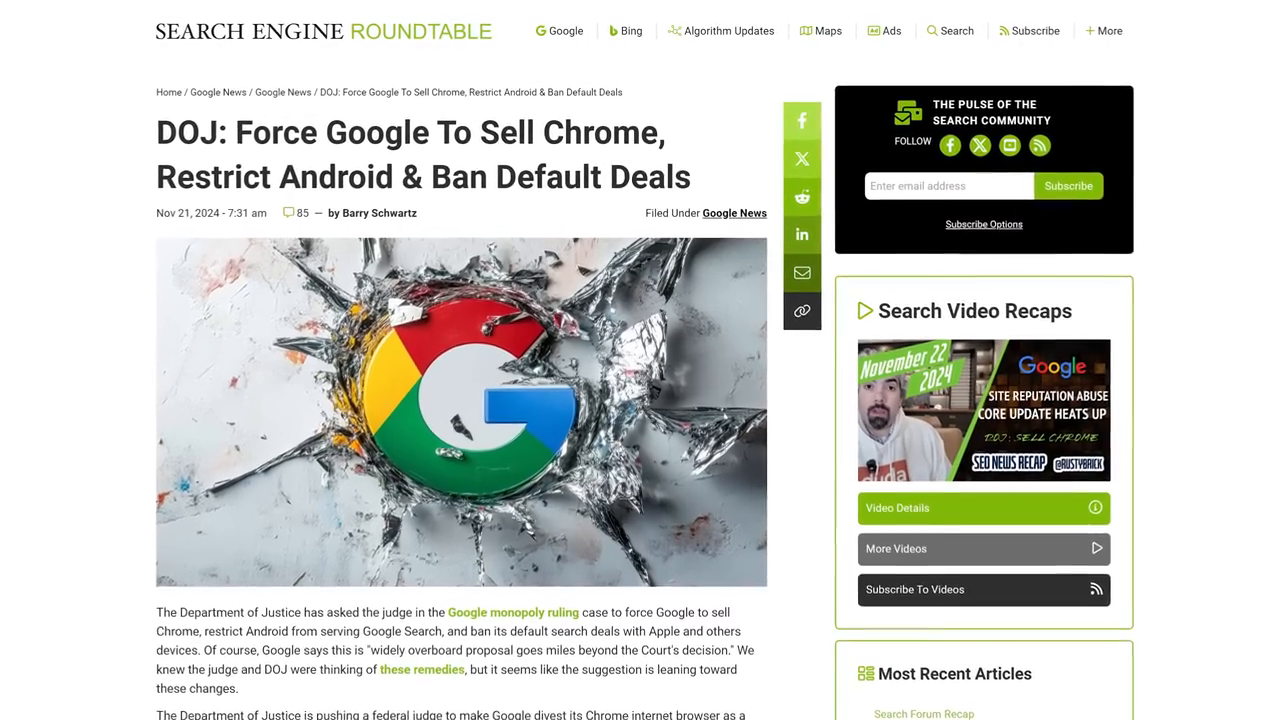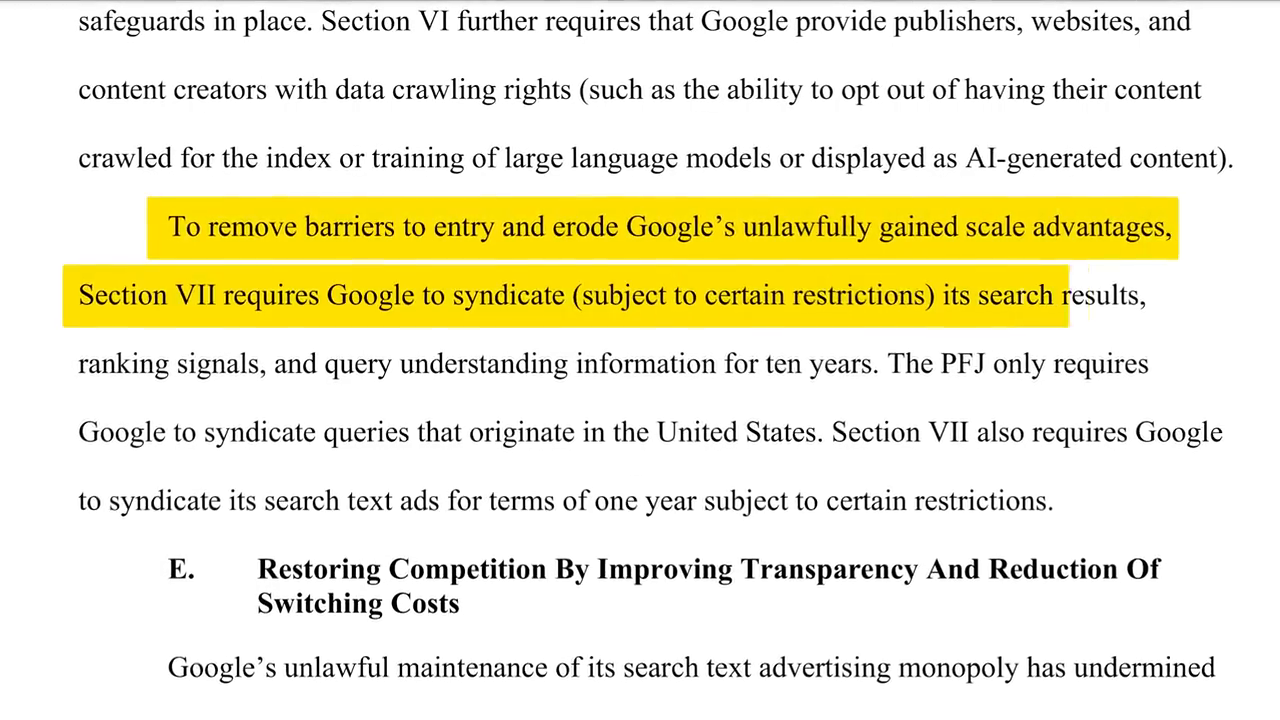Tech news highlights: DOJ vs Google, AI developments, and the ever-evolving tech industry
Every day, the world of technology takes new strides—and today is no different. From antitrust battles against tech giants to the steady rise of artificial intelligence and developments in consumer tech policies, there’s no shortage of news to digest. Let’s dive deep into the latest updates on Google, Microsoft, OpenAI, and more, breaking down the key moments and their implications for the industry and consumers alike.
Google under the DOJ spotlight: Chrome, Android, and monopolies
 The Department of Justice targets Google in a major antitrust case
The Department of Justice targets Google in a major antitrust case
The U.S. Department of Justice (DOJ) isn’t just tapping Google on the shoulder—it’s aiming for a direct hit. As part of its antitrust case, the DOJ is recommending that Google sell off Chrome. In case you didn't know, Google's dominance in internet search had already been ruled as an illegal monopoly earlier this year in August. But Chrome's divestiture might just be "the tip of the iceberg."
The DOJ’s proposals extend beyond Chrome, including:
- Restricting Android from favoring Google Search.
- Banning side deals that make Google the default search engine on major platforms. These agreements currently bring in about $26 billion a year for Google, with companies like Apple and even Mozilla (Firefox) benefiting from such arrangements.
While this might seem like a move toward a fairer tech ecosystem, critics argue it could hurt smaller players like Firefox more than it impacts Google. Mozilla, for instance, significantly relies on Google’s payments to keep its operations running.
Additionally, the DOJ wants Google to divest its investment in AI company Anthropic and provide search data to competitors for the next decade. Google, unsurprisingly, has dismissed these proposals, calling them part of a “radical interventionist agenda” that could disrupt consumers and break its ecosystem of services.
Windows 11 ads and Microsoft’s new features
 Microsoft pushes full-screen notifications for Windows 11 upgrades
Microsoft pushes full-screen notifications for Windows 11 upgrades
Microsoft is at it again with aggressive promotion strategies—this time pushing full-screen ads reminding Windows 10 users of its end-of-support deadline. While these notifications nudge users to upgrade to Windows 11, they also promote purchasing new AI-embedded PCs featuring Co-pilot Plus.
To many, these intrusive pop-ups bring back memories of Microsoft's previous tactics that urged users to upgrade from earlier versions of Windows. Though predictable, these efforts highlight how tech companies often use system-wide notification features to sell upgrades.
Meanwhile, Microsoft introduced an upgraded "Recall" feature for Windows Co-pilot—a tool aimed at managing user data with added encryption and enhanced protection. Coupled with a new AI-enabled right-click function called "Click-to-Search," these additions reflect Microsoft's ongoing focus on AI to improve user productivity, albeit sometimes in ways that feel unnecessary or redundant.
OpenAI’s ambitious leap: A web browser and the rise of AI
 OpenAI reportedly plans to develop its own web browser
OpenAI reportedly plans to develop its own web browser
Amid the potential fallout from Google’s antitrust issues, OpenAI is looking to carve a bigger niche in the digital space. The company is reportedly working on a web browser of its own that would integrate seamlessly with AI tools like ChatGPT. This makes sense given OpenAI’s recent focus on expanding its search capabilities through chat-based interactions.
However, the legal spotlight is casting shadows on OpenAI, too. The company recently made headlines for accidentally deleting critical evidence in its copyright battle with the New York Times. This slip-up underscores the challenges that even AI-first companies face amidst rapid growth and experimentation.
Adding to the AI frenzy, Amazon has doubled down on its partnership with Anthropic, supplementing its existing $4 billion investment with another $4 billion—highlighting how investments in AI remain at an all-time high.
Are we nearing AI saturation or just getting started?
 The AI hype: Here to stay with new shifts toward personal agents
The AI hype: Here to stay with new shifts toward personal agents
Despite speculation about an impending AI bubble collapse, developments indicate otherwise. Research from Stanford and DeepMind recently revealed astonishing advancements, showcasing AI agents that can mimic user behavior with up to 85% accuracy in personality tests—raising eyebrows about how well technology can “understand” and adapt to humans.
On the business side, Nvidia's CEO Jensen Huang predicts an “AI utility” future, showing optimism for a world where we generate AI as effortlessly as electricity. His vision includes AI factories and potential uses well beyond devices as we know them, making this a transformative era for industries.
Season passes on Steam: New rules for transparency
 Steam mandates new rules for developers selling season passes
Steam mandates new rules for developers selling season passes
Valve has addressed long-standing complaints about the lack of clarity surrounding season passes sold on its gaming platform, Steam. Under its new policy:
- Developers must specify the type of DLC included (e.g., “two new weapons” instead of vague descriptions).
- They are given one chance to delay promised content, with a maximum extension of three months.
Failing to comply could mean hefty refunds to consumers—a significant move toward pro-consumer transparency. This update reinforces the trust Valve aims to build with its player base while holding developers accountable for promised content.
Feature-packed: Microsoft Edge game assist
 Microsoft introduces Edge Game Assist for Windows 11
Microsoft introduces Edge Game Assist for Windows 11
Microsoft continues pushing its gaming features, with “Edge Game Assist” emerging as its latest addition. This preview tool integrates into the Windows Game Bar, adding an in-game browser to aid players with quick searches and real-time assistance.
The kicker? The browser detects the game being played and auto-searches relevant content like walkthroughs or fixes. While similar functionalities exist in Steam’s overlay, Edge Game Assist provides a more inclusive solution for non-Steam games.
Consumer finance guidelines and payment app regulations
 The CFPB expands rules to digital payment apps
The CFPB expands rules to digital payment apps
The U.S. Consumer Financial Protection Bureau (CFPB) has announced new rules targeting digital payment platforms. Under these regulations:
- Companies processing more than 50 million annual transactions will be supervised and regulated.
- Issues like fraud protection, consumer privacy, and prevention of illegal account closures will take top priority.
This development aligns Big Tech platforms, such as Apple Pay and Google Pay, with the regulatory scrutiny banks face. It’s a step toward creating a safer financial environment for consumers, even if skeptics doubt how impactful these rules will ultimately prove.
Google kills Pixel Tablet 2 and more
 Google cancels its upcoming Pixel Tablet 2
Google cancels its upcoming Pixel Tablet 2
In surprising (yet not-so-surprising) news, Google reportedly canceled plans for the Pixel Tablet 2—an expansion of its large-format devices portfolio. Reports indicate profitability concerns, though rumors about other Pixel devices being scrapped remain unverified.
This move underscores Google’s inconsistent track record with tablets, leaving many to question whether the company will continue to invest in large-format devices in the coming years.
Data-driven TVs: The new reality
 Adtech company builds its own TV operating system
Adtech company builds its own TV operating system
The Trade Desk, an advertising technology company, has taken its ambitions to the next level by developing a smart TV operating system. Unlike competitors like Roku and Amazon, The Trade Desk doesn’t own content, making its sole focus the collection of user data instead.
This approach emphasizes a broader shift in the TV industry toward monetization through advertising and data rather than just selling hardware. It highlights the growing commoditization of personal data as the driving force behind “affordable” (often subsidized) smart TVs.
Conclusion: Transforming tech, one story at a time
Overall, these developments reveal just how dynamic, exciting, and occasionally chaotic the tech world is. From the DOJ's crackdown on monopolies to transparency efforts in gaming and the ever-present AI frenzy, there's no doubt that technology will continue shaping consumers' experiences—and expectations—in ways both big and small.
Stay tuned for more updates as these stories evolve, because in tech, the only constant is change.
